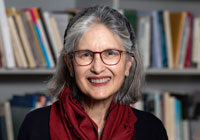
Photo credits:
Johan Wahlgren
Lorraine Daston
Guest of the Principal, SCAS.
Director, Max-Planck-Institut für Wissenschaftsgeschichte, Berlin.
Visiting Professor of Social Thought and History, The John U. Nef Committee on Social Thought,
University of Chicago.
Permanent Fellow, Wissenschaftskolleg zu Berlin
Lorraine Daston received a Ph.D. in History of Science from Harvard University in 1979 after studies
at Harvard and the University of Cambridge. Before becoming one of the three founding directors of
the Max-Planck-Institut für Wissenschaftsgeschichte in 1995, she taught at Harvard, Princeton, and
Brandeis Universities, as well as at the Universität Göttingen and the University of Chicago.
Her work is devoted to the history of rationality, especially but not exclusively scientific rationality,
as pursued through a study of the long-term development of categories of thought such as probability
and evidence, epistemic ideals such as precision and objectivity, and practices such as observation
and image-making. Her publications include Classical Probability in the Enlightenment (1988),
presented with the Pfizer Award of the History of Science Society; Wonders and the Order of Nature,
1150–1750 (with Katharine Park, 1998), also winner of the Pfizer Award; Wunder, Beweise und
Tatsachen (2001); Objectivity (with Peter Galison, 2007); How Reason Almost Lost Its Mind: The
Strange Career of Cold War Rationality (with Paul Erickson et al, 2014), and Against Nature (2019).
While at SCAS she will be completing her book Rules: A Short History of What We Live By (Princeton
University Press). Drawing upon sources as diverse as mathematical tables, the rules of monastic orders,
cookbooks, military strategy, sumptuary codes, rules of games, bureaucratic ordinances, and precepts
of the arts and crafts from Greco-Roman antiquity until the twentieth century, the book traces the
evolution of the rule-as-model to the rule-as-algorithm.
This information is accurate as of the academic year 2019-20.






